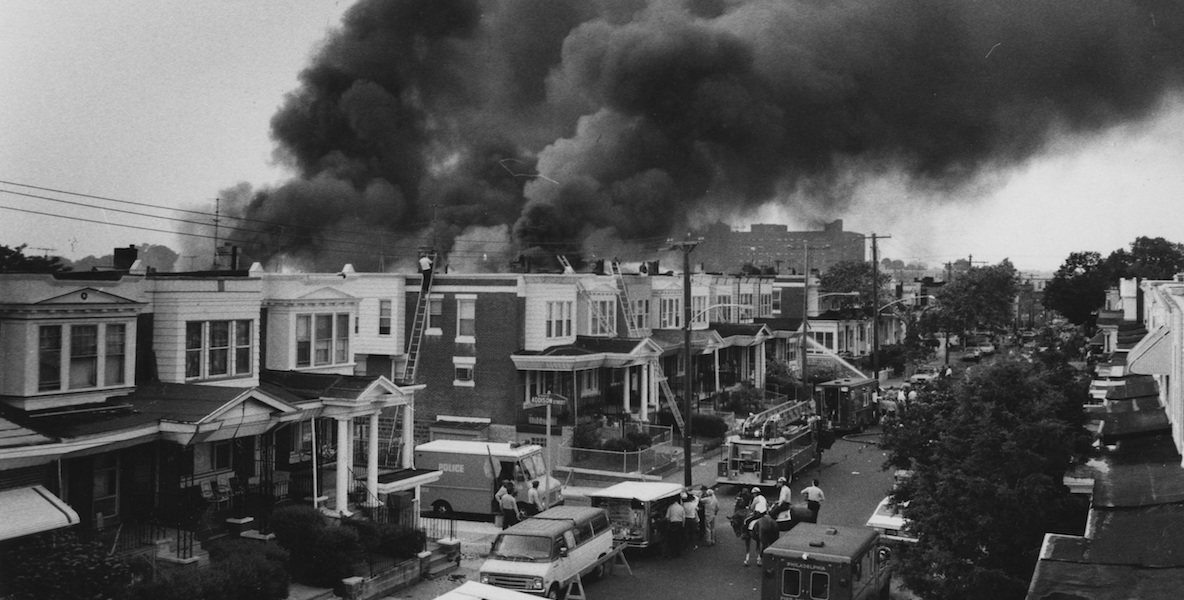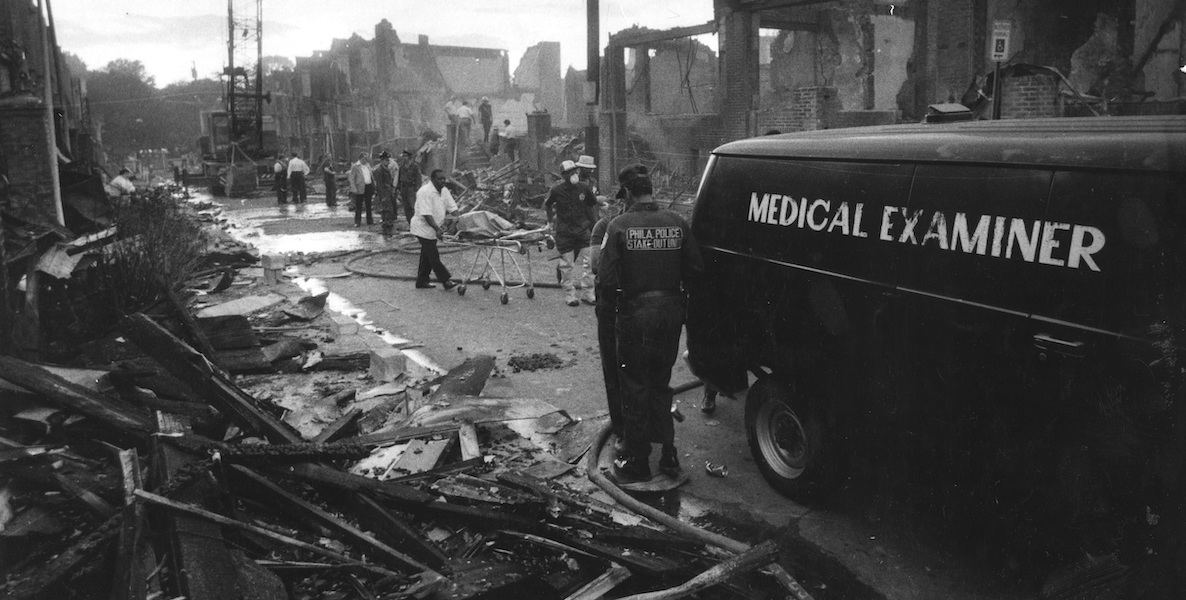![]() Thirty five years ago today, Philadelphia could have gone another way.
Thirty five years ago today, Philadelphia could have gone another way.
At lunchtime that day, the city’s business leaders were gathering at 17th and Market to break ground on a bold new venture, something that announced the city’s renunciation of its parochial and Quaker past. On that day would begin the building of Liberty Place, the first skyscraper in our skyline-deprived metropolis to violate the longstanding gentlemen’s agreement to not exceed the height of William Penn’s statue atop City Hall.
Change was in the air. Like the rest of the country, Philadelphia had gone through some dark times in the ’70s. There was the racial divisiveness of the Rizzo years, there were televised fistfights on the floor of City Council—starring, in this corner, future mayor John Street—and there was rampant crime and dirty, abandoned streets.
Be Part of the Solution
Become a Citizen member.Yet, by 1985, then-Mayor Wilson Goode was riding high. As the city’s first black mayor, Goode was seen as a symbol of racial reconciliation and, as the city’s previous managing director, he was heralded for his technocratic competence.
In Goode’s first year, he received national praise for bringing into City Hall all the wild youths who were defacing public property with graffiti and enlisting them on a crusade to beautify the city by making public art. (His Anti-Graffiti Network would eventually morph into the renowned Mural Arts Program). In early 1984, there were even reports that Goode was being considered for the vice-presidential slot.
All those good vibes changed, however, a few hours after the first shovel was plunged into the earth on the Liberty Place site. For on that very morning 35 years ago today, the city dropped a bomb on the West Philly headquarters of MOVE, oft-described as a radical, back-to-nature group that terrorized a predominantly black working class neighborhood for years, stockpiling weapons, flaunting basic hygiene, and blaring obscene political messages through a bullhorn at all hours.
In many ways, the bombing of MOVE is our city’s perpetual albatross, a human tragedy we’ve never gotten past, even if it’s seldom talked about. So any consideration of a long-overdue apology ought to be welcome.
The blaze ignited by the bomb was allowed to burn until 11 people, including five children, were dead, 61 homes were destroyed and 250 people were left homeless.
In short order, Goode’s image, like his city’s, was in shambles. The bombing eroded any faith Philadelphians had in government, and ushered in an era of widespread official incompetence; the city couldn’t even rebuild the homes it had destroyed.
![]() Goode, in his eighties and a pastor now, penned a piece timed to the anniversary this week in The Guardian calling for an official apology from the city of Philadelphia. He’ll speak about it today on WURD radio at 5:30pm.
Goode, in his eighties and a pastor now, penned a piece timed to the anniversary this week in The Guardian calling for an official apology from the city of Philadelphia. He’ll speak about it today on WURD radio at 5:30pm.
Ed Rendell—then-district attorney—has signed on to the idea, and both men have at least been tangentially involved with an ad-hoc group of former city officials, MOVE members and reconciliation experts that has been meeting for two years in pursuit of some common ground. City Councilmember Jamie Gauthier, who represents the site of the bombing on Osage Avenue, plans to introduce a draft apology resolution.
Meantime, Mayor Kenney and City Council President Darrell Clarke have remained mum on the question.
As we learned from South Africa in the aftermath of apartheid, there can be no reconciliation without truth.
Look, in many ways, the bombing of MOVE is our city’s perpetual albatross, a human tragedy we’ve never gotten past, even if it’s seldom talked about. So any consideration of a long-overdue apology ought to be welcome. But why do I feel so uneasy? Why does the coverage of all this feel so very… pat?
I guess because, as we learned from South Africa in the aftermath of apartheid,![]() there can be no reconciliation without truth. I’d wager that most Philadelphians can’t really tell you what happened that day 35 years ago, making an apology run the risk of being just more daily noise, when what we really need is something that breaks through.
there can be no reconciliation without truth. I’d wager that most Philadelphians can’t really tell you what happened that day 35 years ago, making an apology run the risk of being just more daily noise, when what we really need is something that breaks through.
What we learned from South Africa’s Truth and Reconciliation Commission is that story matters most. The Commission, chaired by Archbishop Desmond Tutu, featured raw testimony that bore personal witness to all the injustices apartheid had sanctioned.
Once the emotional complexities had been laid bare through people’s stories, that’s when apology shifted the ground of an entire country and changed the course of its history. Reconciliation was only possible after the whole country—and not just victim and victimizer—saw and felt the whole story.
That’s why I wish the debate over an official apology in 2020 could occur in the context of what actually happened that day to real people, in real time—as documented in the forthcoming film, Philly On Fire.
The product of Delaware filmmaker Ross Hockrow and producer Gary Cohen, Philly on Fire doesn’t yet have a distributor as they’re still raising funds to cover the film’s TV rights’ fees. But their work gives us such intimate portraits of the players on that day, painting those on all sides with broad brushstrokes of humanity, that, in its raw storytelling power, it offers a roadmap to reconciliation. Take a look at the extended trailer:
In Philly on Fire, you get context—its evocation of Frank Rizzo’s Philadelphia is dead-on—and you get characters who make you feel the human complexity of the conflict.
You get the coolly analytical gaze of longtime journalist Linn Washington; the comfortable-in-his-skin humanity of Andino Ward—father of Birdie Africa, the 13-year-old survivor of the blaze; the tortured searching of Jim Berghaier, the cop who saved Birdie and was promptly treated like a traitor to his race by his brethren on the force; the righteous indignation of Ramona Africa, the other MOVE survivor, revolutionary to the end; the not-quite-there-yet struggle of Goode to just take full responsibility, hard stop; and the no-nonsense practicality of the character who gives me the most hope, Clifford Bond, the former Osage Avenue block captain who doesn’t spare police or MOVE from his withering condemnation.
Before we go through all the public motions of an apology, let’s let “Story First” be our driving principle, in the hope that understanding will lead to heartfelt apology, and ultimately real common ground.
Seeing and hearing these characters, feeling them, is really what reconciliation is all about. Sure, there are Biblical passages about what reconciliation is, but I think, for our purposes, my accountant offers the best definition: The process of ensuring that two sets of records are in agreement.
MOVE is not one, but many stories, as Philly On Fire illustrates, and bringing all of them into agreement is above the paygrade of a City Council resolution. Before we go through all the public motions of an apology, let’s let “Story First” be our driving principle, in the hope that understanding will lead to heartfelt apology, and ultimately real common ground.
Photo courtesy Temple University archives



